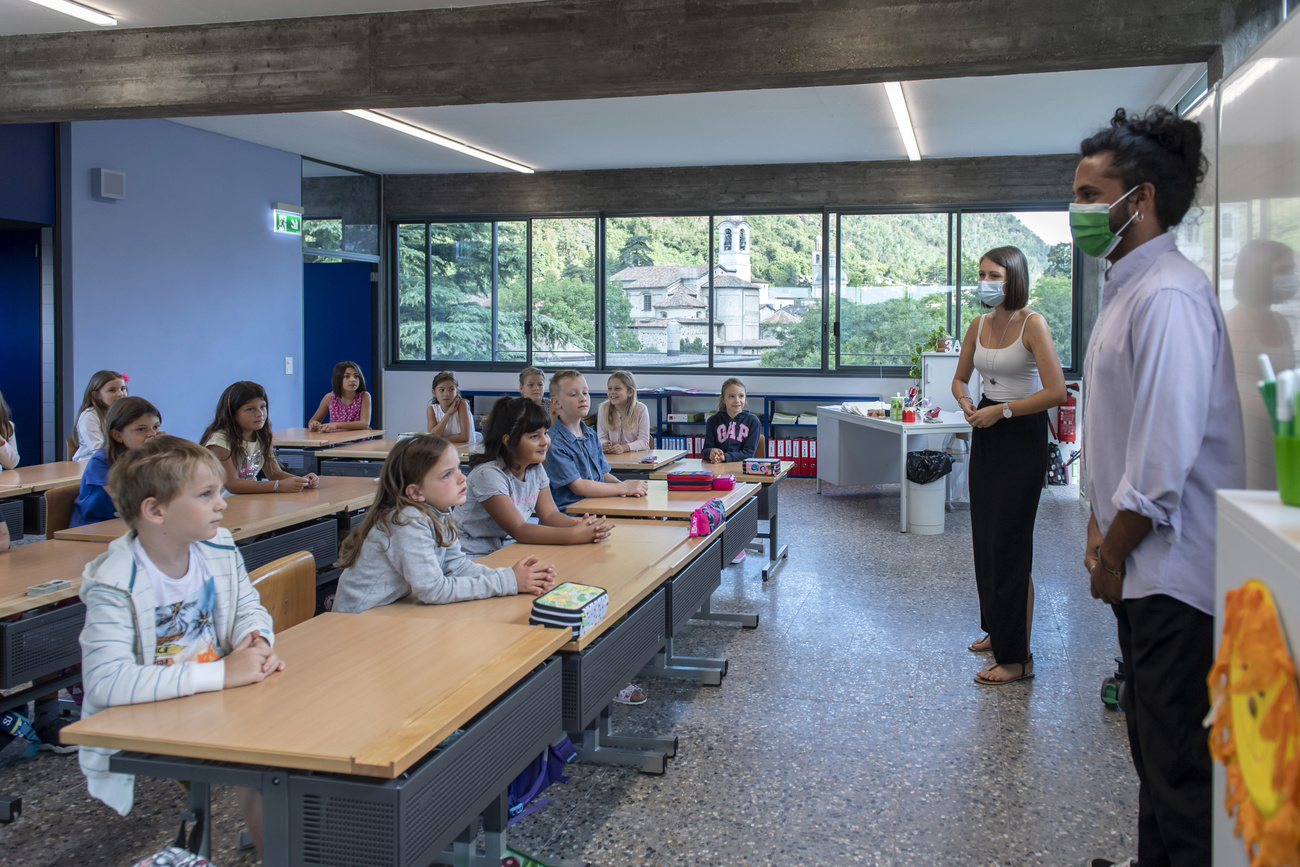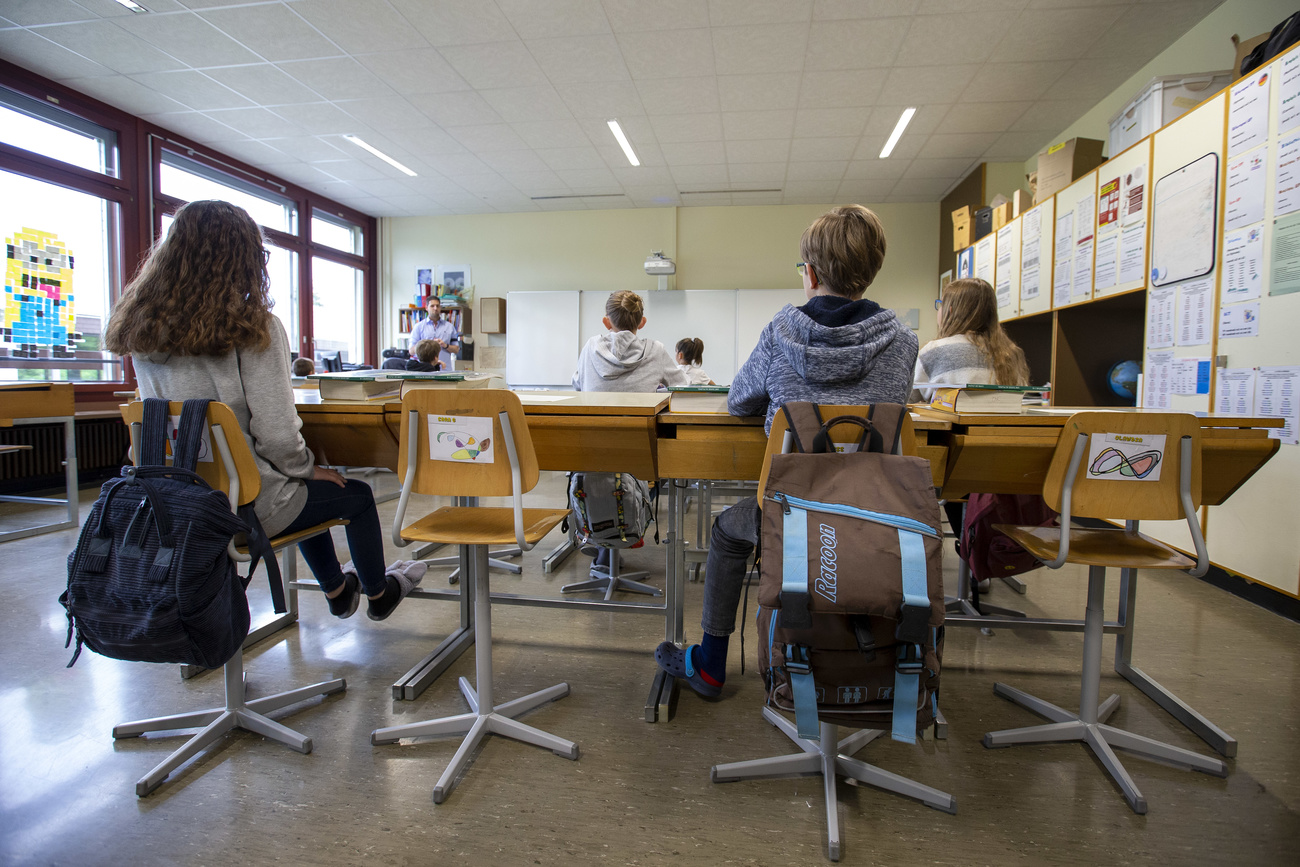Educational inequalities highlighted by Covid-19 pandemic

The coronavirus pandemic has exposed existing inequalities in access to education and training, the Organisation for Economic Development and Co-operation (OECD) says. Switzerland is no exception.
In particular, the pandemic risks “exacerbating existing learning gaps”, the OECD said on Thursday in its Education at a Glance 2021External link report, which compares education systems in 46 countries.
In Switzerland there have been concerns that some disadvantaged pupils fell through the learning net during the shutdown of schools in spring 2020 – by not having anywhere quiet to study, access to computers or not turning up to online lessons.
Switzerland was among countries in the report which said that additional measures had been taken to support the education of these pupils during the pandemic, including subsidising devices.
However, it was not among the countries that allocated additional funds to ensure resources targeted those who needed them the most, the report’s country notes for SwitzerlandExternal link.
The fact that socio-economic status strongly influences educational outcomes in Switzerland has long been flagged up by the OECD. For example, students from lower socio-economic backgrounds are more likely to opt for the vocational route over the academic one. Foreign-born adults are also more likely to face problems on the jobs market, it says.
The Education at a GlanceExternal link report analyses the education systems of the OECD’s 38 member countries, as well as of Argentina, Brazil, China, India, Indonesia, the Russian Federation, Saudi Arabia and South Africa.
This year’s edition includes a focus on equality of opportunity for access, participation, and progression in education, as well as the impact of the Covid-19 pandemic. The OECD’s fourth State of Global Education; 18 months into the Pandemic report was also released at the same time.
Schools: open
Where Switzerland differed to many OECD countries was in its approach to school closures. The aim has been to keep schools open as much as possible.
“Schools in Switzerland were closed for a shorter time than in most other OECD countries in 2020, although Covid infection rates per million inhabitant were above the average in OECD countries,” Marie-Helene Doumet of the OECD told SWI swissinfo.ch via email.
“Pre-primary, primary, and lower secondary schools were fully closed for 34 days in 2020 compared to 44, 59 and 65 days respectively on average across OECD countries. Only upper secondary schools closed for longer (56 days), though still below the OECD average of 70 days.”
“In 2021, schools remained fully open in Switzerland at all levels of education while they were fully closed for 11-31 days on average across education levels [in the OECD],” she added.
In Switzerland schools closed nationwide on March 16, 2020 – an unprecedented step by the government as cantons are usually in charge of educational matters. They reopened progressively from May 11, 2020, with younger pupils going back first.
However, since the new school term begun in August this year – under differing regimes depending on the canton — there has been a spike in coronavirus cases among pupils. Some schools are recommending or stipulating mass testing, others masks. Some cantons have dropped mass testing. This has led to some questioning of the Swiss/cantonal approach and for calls for more to be done to protect children in schools.

More
After the summer break, Swiss schools see a spike in Covid cases
Low-skilled adults
The pandemic also had an impact on employment, as economies and the job market were upended by lockdowns, economic constraints and changes in demand. But again, the situation in Switzerland was slightly different than other OECD countries, with the employment of lower-skilled adults being more affected than that of high-skilled ones, Doumet said.
The unemployment rate among 25-34 year-olds with below upper secondary attainment (who generally left school at 15/16) rose by 3.6 percentage points since 2019, reaching 13.4% in 2020, while the unemployment rate for tertiary-educated adults (those for example, with a university education) remained stable, she said.
“In contrast, unemployment increased by a similar amount (by less than 2 percentage points) for adults with below upper secondary and tertiary education on average across OECD countries,” Doumet added.

In compliance with the JTI standards
More: SWI swissinfo.ch certified by the Journalism Trust Initiative







You can find an overview of ongoing debates with our journalists here. Please join us!
If you want to start a conversation about a topic raised in this article or want to report factual errors, email us at english@swissinfo.ch.